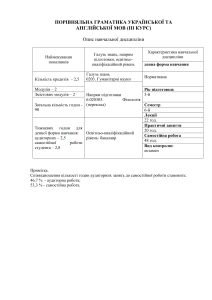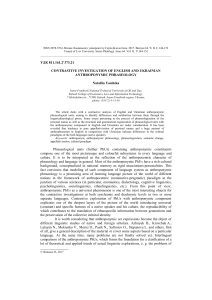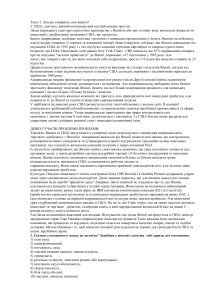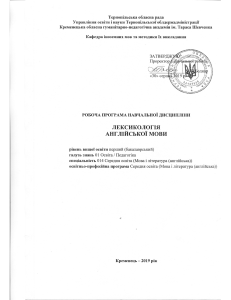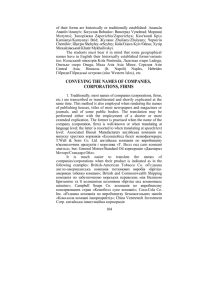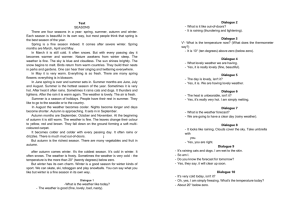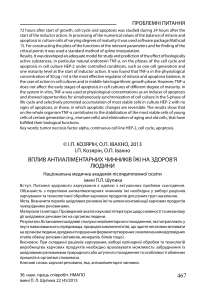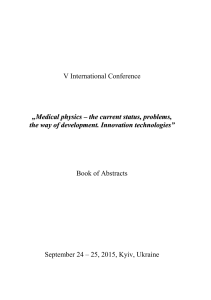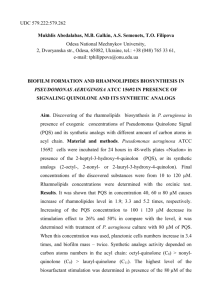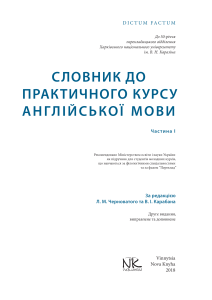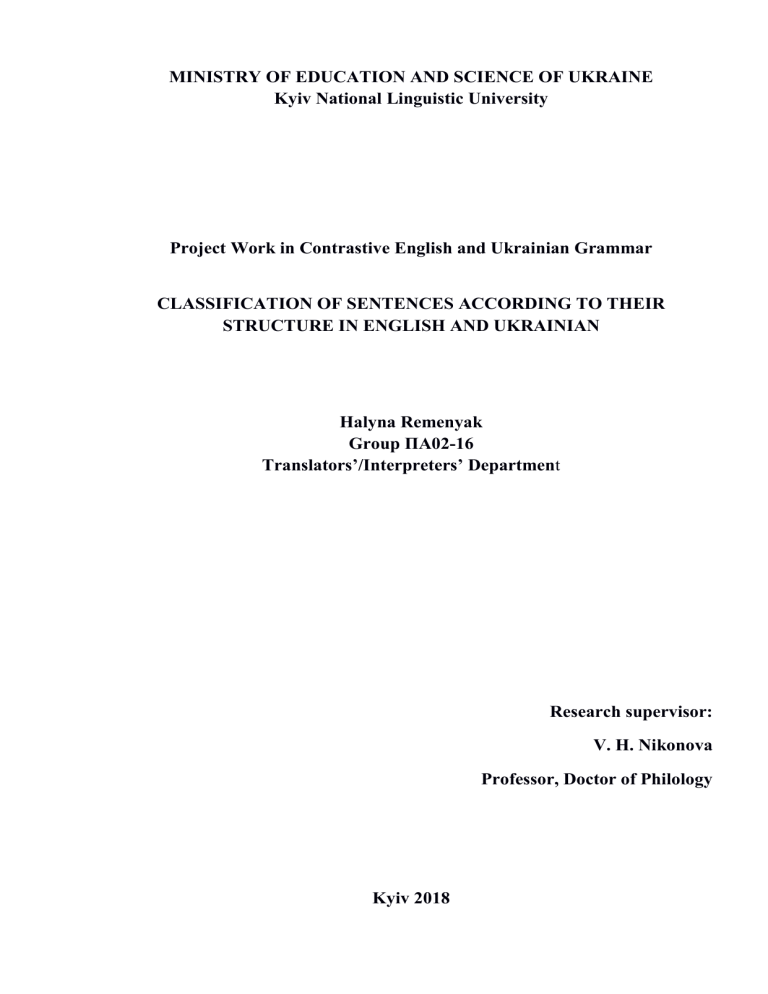
MINISTRY OF EDUCATION AND SCIENCE OF UKRAINE Kyiv National Linguistic University Project Work in Contrastive English and Ukrainian Grammar CLASSIFICATION OF SENTENCES ACCORDING TO THEIR STRUCTURE IN ENGLISH AND UKRAINIAN Halyna Remenyak Group ПА02-16 Translators’/Interpreters’ Department Research supervisor: V. H. Nikonova Professor, Doctor of Philology Kyiv 2018 THEORETICAL FOUNDATION OF THE PROBLEM The basic unit in the syntactic structure of language is the sentence. There are many definitions of the sentence. In linguistics, a sentence is the syntactic unit, any coherent connection of words, which expresses a relatively complete opinion or a certain emotion and acts as the main means of communication. According to the British linguist and editor of English Today, Tom McArthur, a sentence is a set of words complete in itself as the expression of a thought, containing or implying a subject and a predicate, and conveying a statement, question, exclamation or command [McArthur, p. 134]. There are the following features of the sentence [Блох, c. 383]: 1) Communicativeness Each sentence is aimed at rendering some information. Such information exchange proves the role of communication as one of sentence indicators. 2) Predicativity Predication establishes a certain grammatical combination of words. Sentence semantics presents the unity of nominative and predicative aspects. 3) Modality The ground for expressing the speaker’s attitude towards the content of an utterance is modality. According to their structure, all English and Ukrainian sentences are divided into: 1. One-member (single-nucleus) sentences; 2. Two-member (double-nucleus) sentences; A two-member sentence has two members – a subject and a predicate. If one of them is missing it can be easily understood from the context. For example: The police are looking for Ken Brown everywhere. A two-member sentence can be: 1. complete 2. incomplete. The complete sentence has a subject and a predicate. The incomplete or elliptical sentence has only one of the principal parts (the subject or the predicate) or both of them are missing, but can be easily understood from the context. For example: Where was she yesterday? At the office. The two-member sentences are divided into: 1. simple (There is only one predicative link.) 2. composite (It can have more than one link.) The simple sentence is the sentence that contains only one subject-predicate unit. The classification of simple sentences is based on two principles [Каушанская, c. 221]: A. according to the purpose of the utterance; B. according to the structure. According to the purpose of the utterance, all English and Ukrainian sentences are divided into: 1. Declarative sentences: The door opened. He made no remark. Раптом вона заплакала. Він не заперечував цього. 2. Interrogative sentences: Did you do that? Ти це зробив? 3. Imperative sentences: Go to the classroom! Говори правду! 4. Exclamatory sentences: How wonderful it was! Як гарно! The composite sentences can be: 1) compound sentence A compound sentence is a sentence which consists of two or more clauses coordinated with each other. 2) complex sentence. If one of the clauses in a composite sentence governs another one, they are linked subordinately. A one-member sentence is a sentence in which there is only one member (the subject or the predicate). The one-member sentences in the English and Ukrainian languages are divided into: 1) nominative (Night. Measure for Measure. Темнота та тиша. Чудовий сон!); 2) inducive (Go right now! Проходьте!); 3) exclamatory (Great! Як гарно!); 4) infinitival (To be or not to be? Що робити?); 5) elliptical (Taking risks? Подумав?). In Ukrainian, the one-member sentence can be: a) definite personal (Розплющую очі і раптом бачу своїх друзів). b) indefinite personal, where the doer of an action is not identified (Нам подали на стіл обід). In English the predicate in the sentences conveying the same idea is expressed in the Passive Voice form (We were served coffee); c) generalized personal, where any person may be the doer of the action (Хліб сіль їж, а правду ріж. Працювали весь день). In the English equivalent sentences the subject may be expressed by one, we, you (One can enjoy the show. You can’t be happy about it); d) impersonal, where the doer of an action can’t be reconstructed (Завечоріло. Прохолодно. Мені боляче.). In the corresponding English sentences most often we use the formal subject It / There, or change the structure of the sentence (Twilight set in. It is getting cold. It gives me much pain. There are pencils on the table). PRACTICAL ASSIGNMENTS Exercise 1. Define the type of the sentences according to their structure in English. Identify the subject and the predicate in the sentence. 1. The staff is ready to co-operate on the project. 2. Keep aside, keep aside! 3. The police are looking for Ken Brown everywhere. 4. Have you ever heard of food produced from algae? 5. We have dealt with these phenomena for a long time. 6. Dusk of a summer night. 7. Bacteria can be seen only through a microscope. 8. Thieves! 9. The weather was wonderful so my friends and I went for a walk. 10.I passed all of my English exams. I was successful for the first time. Keys: 1. The staff is ready to co-operate on the project. – two-member sentence 2. Keep aside, keep aside! – one-member, imperative sentence 3. The police are looking for Ken Brown everywhere. – two-member sentence 4. Have you ever heard of food produced from algae? – two-member sentence 5. We have dealt with these phenomena for a long time. – two-member sentence 6. Dusk of a summer night. – one-member, nominal sentence 7. Bacteria can be seen only through a microscope. – two-member sentence 8. Thieves! – one-member, exclamatory sentence 9. The weather was wonderful so my friends and I went for a walk. – twomember, compound sentence 10.I passed all of my English exams. – two-member sentence Exercise 2. Divide the following Ukrainian one-member sentences into the columns according to their types: 1. Навкруги було безлюдно. 2. У повітрі стало тепліше. 3. Весною в селі прокидаються рано. 4. Пробігаємо вже третій раз цією вулицею. 5. По правді роби, по правді й буде. 6. Хочеш переглянути цей фільм? 7. Що посієш, те й пожнеш. 8. Завтра писатимемо контрольну роботу. 9. На Великдень ходять до церкви усією родиною. 10.Надворі почало сутеніти. Keys: Definite personal Indefinite Generalized personal personal Пробігаємо вже Весною в селі По правді роби, Навкруги було третій раз цією прокидаються по правді й буде. безлюдно. вулицею. рано. Що посієш, те й У повітрі стало Хочеш На Великдень пожнеш. тепліше. переглянути цей ходять до церкви Надворі почало фільм? усією родиною. сутеніти. Завтра Impersonal писатимемо контрольну роботу. Exercise 3. Define the type of the sentences according to their structure in English. 1. What are you doing on Saturday? 2. Fire! 3. To be or not to be? 4. It is thundering. 5. I am going to the countryside on the weekend. 6. I haven’t been to the countryside since December. 7. I am leaving at the afternoon. 8. So you will be there for the whole weekend. 9. It is time to start. 10.No. Not a thing. Keys: 1. Two-member sentence 2. One-member sentence 3. One-member sentence 4. Two-member sentence 5. Two-member sentence 6. Two-member sentence 7. Two-member sentence 8. Two-member sentence 9. Two-member sentence 10. One-member sentence Exercise 4. Define whether the sentence is complex or compound: 1. I need to work hard so that I can pass the exam. 2. Although he was the best candidate, he didn’t win the elections. 3. When you come back from your trip, we’ll meet to discuss the problem. 4. The rain fell softly, the house was quiet. 5. I wish you had come earlier. 6. The darkness was thinning, but the street was still dimly lighted. 7. She often read books, but never goes to the cinema. Keys: 1. Complex sentence 2. Compound sentence 3. Compound sentence 4. Compound sentence 5. Complex sentence 6. Compound sentence 7. Complex sentence 8. Compound sentence Exercise 5. Match the sentences with their types. 1. Мені хочеться додому. a) definite personal 2. Прекрасне сонце! b) indefinite personal 3. Ні риба, ні м'ясо. c) nominal 4. Нам допомогли з домашнім d) generalized personal завданням. 5. Розкриваю книгу і поринаю у її чудовий світ пригод. Keys: 1. e 2. c 3. d 4. b 5. a e) impersonal THE LITERATURE USED 1. McArthur T. The Oxford companion to the English language / Tom McArthur. Oxford University Press, 1992. – 134 p. 2. Блох М. Я. Теоретическая грамматика английского языка [Текст]: учебник. Для студентов филол. фак. ун-тов и фак. англ. яз. педвузов / М.Я. Блох. – М.: Высш. школа, 1983. – 383 с. 3. Бровченко Т. О. Основи контрастивного аналізу мов // Порівняльні дослідження з граматики англійської, української, російської мов. – К., 1981. 4. Каушанская В. Л., Ковнер Р. Л. и др. Грамматика английского языка. Морфология. Синтаксис. / В. Л. Каушанская. – К.: ИНКОС, 2013. – С. 221 – 225.

